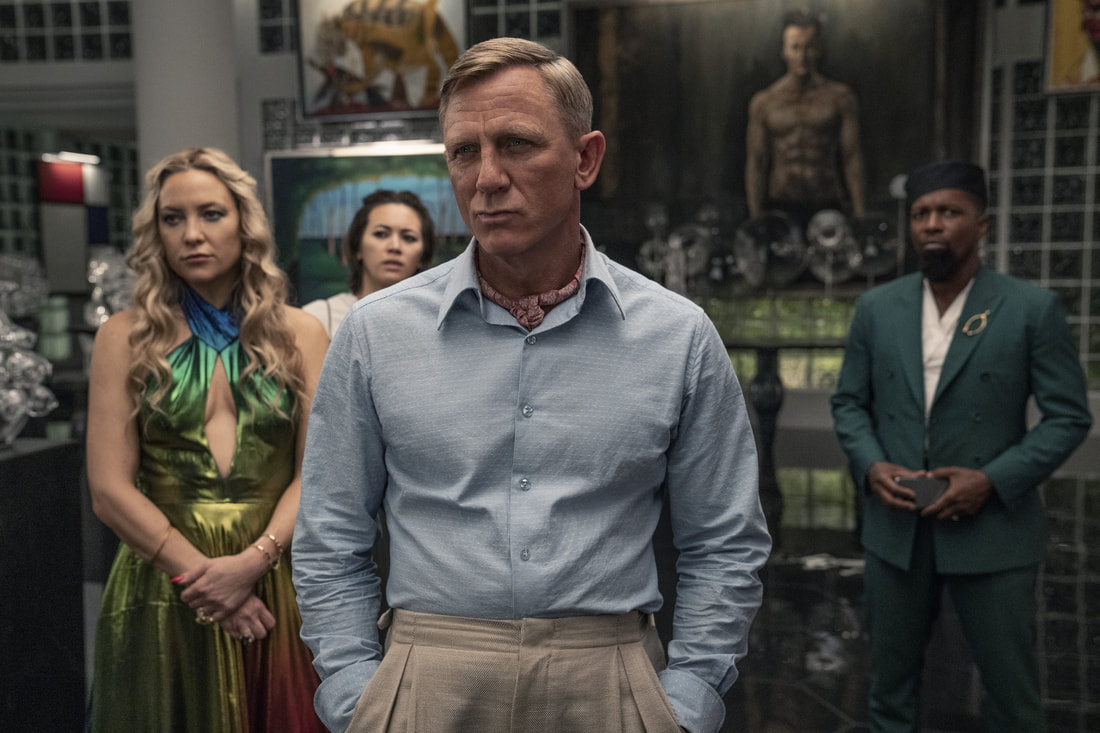Glass Onion is the product of a person who loves the genre, even moreso than Knives Out. Johnson, who also wrote the script, uses every trick of perspective and framing to withhold information from the audience, waiting until it’s appropriate to reveal a new way to look at a scene. A scene the viewer saw for 30 seconds gets stretched to 40, or the camera rotates ninety degrees to show who else was in a room. Somehow, there’s never a sense of superiority that leaks into the film, like Johnson is laughing at the viewer for not realizing something that they couldn’t have with present information. He’s a jaunty magician, just as excited as the viewer to see how a trick unfolds. At the film’s center is a burning injustice, something that might clash with the film’s frivolous tone but pairs nicely. There’s a real rooting interest beyond the whodunit, such that this silly story with these mostly unserious people must be wrapped up satisfactorily to rebalance the moral universe.
The universe that Johnson’s created liberally borrows from the real one of a few years ago. The eight or nine figure world of Knives Out didn’t have to exist in 2019; its setting of country houses and literary estates could’ve happened in any period. Glass Onion’s gaudy wealth is fixed in the present day, infected with modern architecture and TEDx-speak about disruption. Johnson isn’t taking aim at any one individual but at a cultural moment, somewhat passed, that treats the wealthy as visionaries whose fortunes allows them to opine on whatever topic they want and be received as the geniuses they imagine themselves to be. Covid exists in the world of the film, but it’s waved away in an Ethan Hawke cameo. He plays one of Miles’ flunkies, and gives each character a quick squirt of something up their nose, freeing them from masks and any Covid concerns. This is not the focus of the film, but one of many tossed-off details that build the film’s world, where the rich either have cured disease, or more likely, believe that they have because who else but them?
The part of Glass Onion that’s more thoughtful and satirical sits comfortably next to the part of it that is sheer entertainment, thanks to the cast’s considerable chemistry. Craig again proves how comfortable he is with this character, a molasses-tongued sleuth leading the audience through murderous machinations with charm and the occasional burst of pathos. Johnson gives a tiny window into Blanc’s home life here, but it’s as unnecessary as all the backstory that plagued Craig’s run as James Bond. This franchise does such a great job crafting the characters that the mystery is happening to that the person solving it becomes a charismatic afterthought. Monae steals the film as the odd woman out, alienated from her old friend group and desperately holding onto what dignity she has left. Glass Onion gives her the most to play with, and it provides her with the chance to be as good as she’s ever been. Norton is excellent as Miles, speeding past mispronounced words in a bluster of confidence, and Hudson reemerges from years in the wilderness as a comedic master, daffily and hilariously repulsive.
As for the mystery itself, Johnson has figured out how to take this well-worn genre and make it feel new again. In the same part of the year, another star-studded murder mystery, See How They Run, left little to no impression, but the difference in the two films is stark. The inherent clockwork nature of the genre is masked by Johnson, perhaps due to the bigness of his characters and the ostentatious production design. Distraction is a big part of slight of hand, and nobody’s doing it better. Glass Onion is the work of a master illusionist, finding new ways to pull this specific rabbit out of its hat. A-

 RSS Feed
RSS Feed